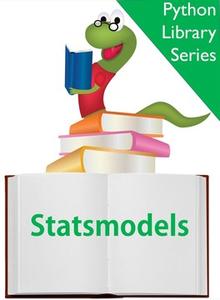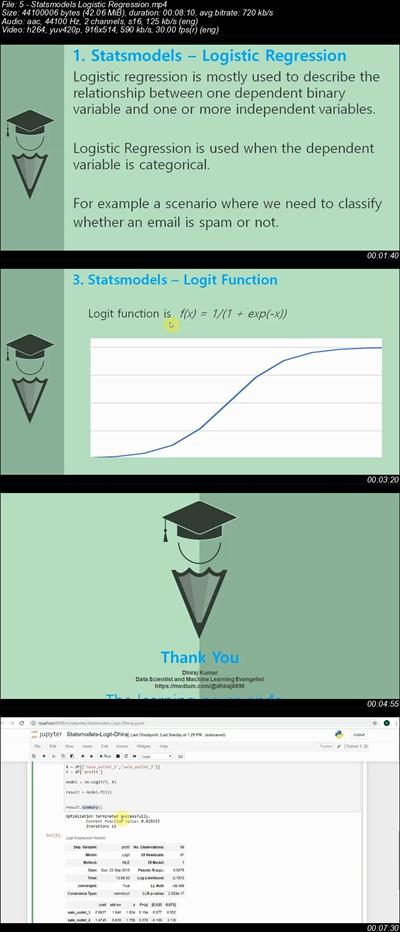Python Library Series: The Definitive Guide to Statsmodels
.MP4 | Video: 916x514, 30 fps(r) | Audio: AAC, 44100 Hz, 2ch | 290 MB
Duration: 52 mins | Genre: eLearning | Language: English
Dhiraj, a data scientist and machine learning evangelist, continues his teaching of Python libraries by explaining through both lecture and practice the Statsmodels library.
Click here to watch all of Dhiraj Kumar's courses including the full Python Library Series.
In this course, become adept with the Statsmodels library through these seven topics:
Introducing Statsmodels. This first topic in the Python Library series introduces this Python package which allows us to explore data, create statistical models, and perform statistical tests. Learn all about this Python stack oriented towards data analysis, data science, and statistics. Statsmodels is built on top of the numeric library Numpy.
Statsmodels Advantages and Disadvantages. Know the advantages of Statsmodels in this second topic in the Python Library series. Statsmodels offers hardcore statistics, econometrics support, strong R programming language alignment, and post-estimation analysis. Disadvantages include poor documentation, less features than scikit-learn, and less modular.
Statsmodels Installation. Install Statsmodels in this third topic in the Python Library series.
Statsmodels Linear Regression. Perform linear regression using Statsmodels in this fourth topic in the Python Library series. Linear regression is an algorithm that finds a linear relationship between a dependent variable and an independent variable. It is a statistical method that allows us to determine the relationship between two continuous variables.
Statsmodels Logistic Regression. Perform logistic regression using Statsmodels in this fifth topic in the Python Library series. Logistic regression is an algorithm that describes the relationship between one dependent binary variable and one or more independent variables.
Statsmodels ARIMA. Forecast time series using Statsmodels Auto Regressive Integrated Moving Average (ARIMA) in this sixth topic in the Python Library series.
Statsmodels Seasonal ARIMA. Forecast seasonality using Statsmodels Seasonal Auto Regressive Integrated Moving Average (SARIMA) in this seventh topic in the Python Library series.
Download link:Kod:rapidgator_net: https://rapidgator.net/file/03dcd5561f6f752ebcb7e50e219c3985/w9nj5.Python.Library.Series.The.Definitive.Guide.to.Statsmodels.rar.html nitroflare_com: https://nitroflare.com/view/DDA8FD81B8F0A4F/w9nj5.Python.Library.Series.The.Definitive.Guide.to.Statsmodels.rarLinks are Interchangeable - No Password - Single Extraction
1 sonuçtan 1 ile 1 arası
Threaded View
-
11.10.2019 #1Üye



- Üyelik tarihi
- 20.08.2016
- Mesajlar
- 151.019
- Konular
- 0
- Bölümü
- Bilgisayar
- Cinsiyet
- Kadın
- Tecrübe Puanı
- 161
Python Library Series The Definitive Guide to Statsmodels
Konu Bilgileri
Users Browsing this Thread
Şu an 1 kullanıcı var. (0 üye ve 1 konuk)



 LinkBack URL
LinkBack URL About LinkBacks
About LinkBacks






 Alıntı
Alıntı
Konuyu Favori Sayfanıza Ekleyin